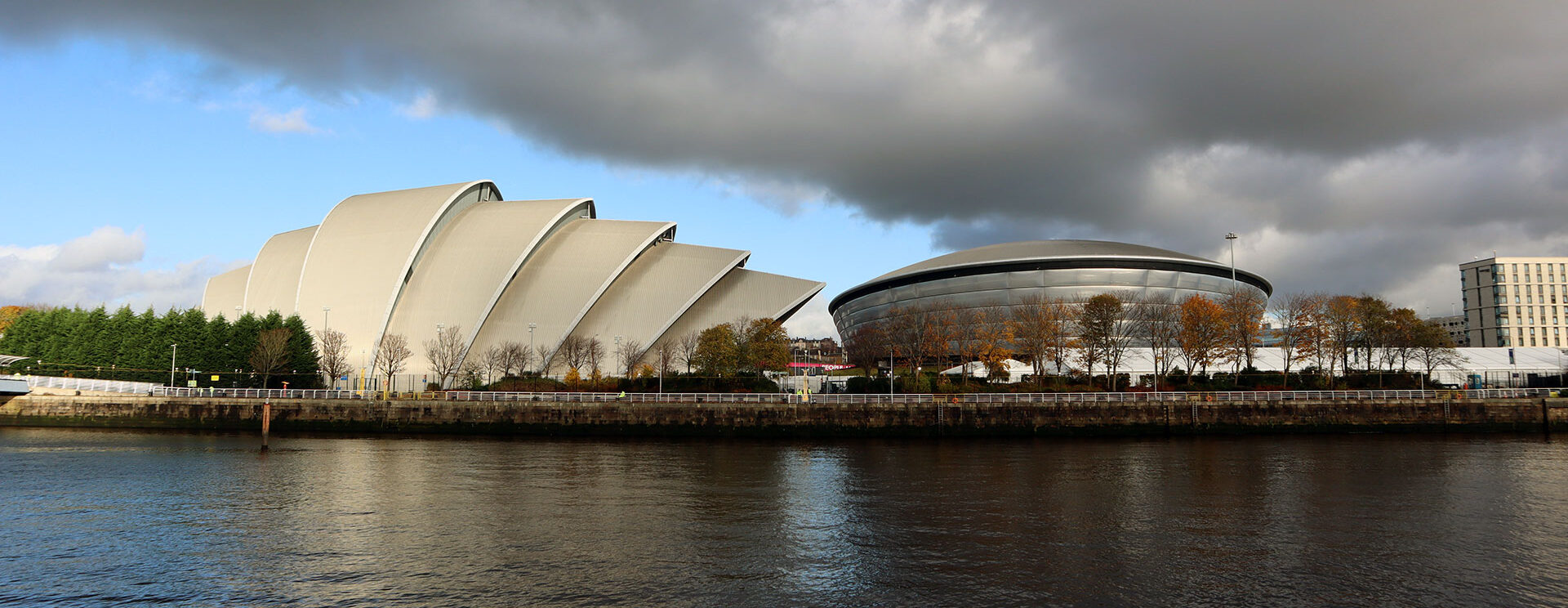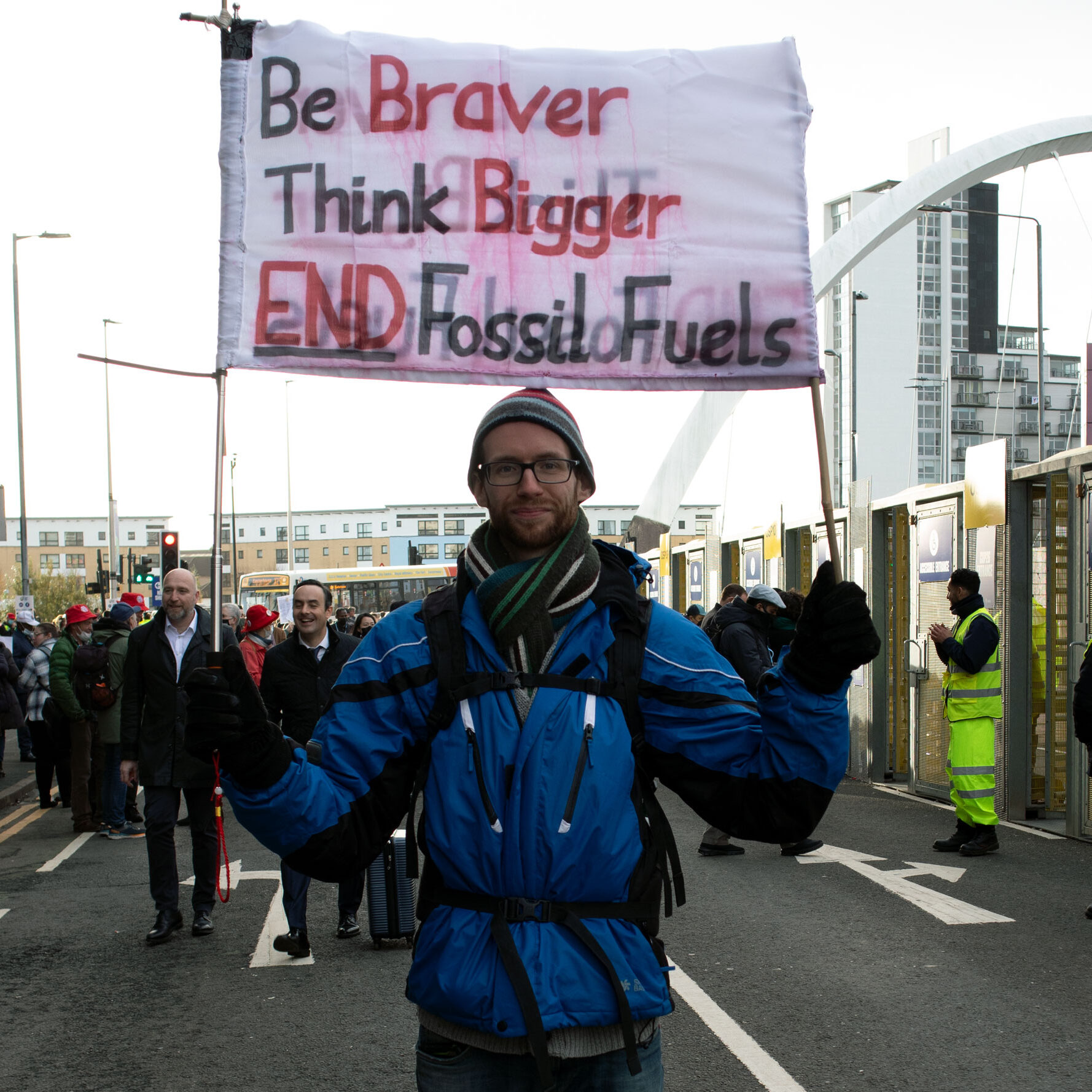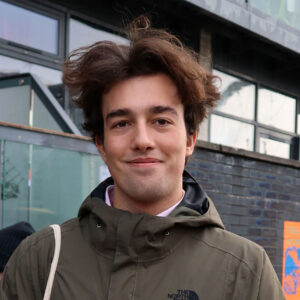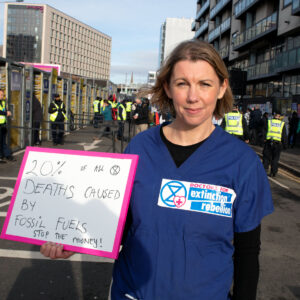

Protestors were asked to share their feelings about climate change and more specifically about London’s role in leading green efforts as the capital of the country.
COP26 in Glasgow came to an end on November 13, one day later than planned. A wide range of environmental issues were discussed, including the move away from fossil fuels and the 1.5 degrees target for global heating.
Outside the COP26 venue, protesters demonstrated day after day. Many of them came from outside Glasgow, and it was not unusual for them to stay there for the whole event. The Raven spoke to protesters about what they wanted to see changed after the event – and what role our city, London, must play.
 Louis Keal, 31, Ex-physicist
Louis Keal, 31, Ex-physicist
I’m from near Nottingham but am now based in Birmingham. I left my job in June to become a full-time protester.
What I’m doing today is standing outside the entrance of COP26 with this banner that says, “Be braver. Think bigger. End fossil fuels”.
I’m trying to be like an advertisement or a billboard that reminds people that the most important thing is ending our reliance on fossil fuels. Because speaking to delegates as they go in, many of them have said that almost nobody in the meeting discusses this topic. The people there are too stuck in thinking fossil fuels are needed, and they need to think bigger.
We need a rapid transition away from fossil fuels and towards green energy. We need to move away from all having our personal cars because even electric cars can’t solve the problem. We need mass transit solutions, electric buses, electric trains, and this kind of thing.
London obviously has a very large role to play in leading the way to making public transport free. Cycling is far safer and more accessible. London could really show the world what’s possible. How changing to green options that allow our civilization to survive can actually improve our lives and improve our spaces.
Of course, the City of London, where the financial institutions are located represent the primary barriers to the changes that our civilization needs to survive. We need to make sure that the very wealthy and powerful organisations based in London aren’t allowed to get in the way of the changes that civilization needs to make.
 Ben Matthews, 20, Student at London School of Economics
Ben Matthews, 20, Student at London School of Economics
I’m here today to distribute leaflets on hydrogen technology. The people are generally very supportive, especially around the conference. They understand how important it is to make radical changes.
I am looking at how businesses can change their activities. They are positive and hopeful but also scared that if we don’t act now, then it will be too late in the future.
I live in London, and I think London has a huge opportunity to improve its environment and status as a leader in the world. You could look at electrification of the public transport network, and you can look at increasing the availability of public transport.
This is so that people don’t use cars on the roads, especially where I live. It’s near the large roads, just south of Regent’s Park. There are so many fumes and little particles. If we use public transport and reduce cars, then we can really reduce emissions which would be better for everyone’s health. So they need to lead the situation. Pedestrianization and a government’s investment in public infrastructure are what’s really needed.
 Grace Thompson, 40, Family Doctor
Grace Thompson, 40, Family Doctor
I’m here from Bristol in the UK because I’m really worried about humanity—about everyone, in particular the future generations—people within the Global South and our children face a very uncertain future.
Maybe I speak for my children as a mother but also, I speak for my patients who are affected by climate and ecological degradation now, even in this country. Let alone the millions of people who are dying in the Global South because of climate and ecological distractions.
London is the biggest carbon producer. They have the City of London, so they are now responsible for the finances and massive consumers. In the West, we’re just consuming our way to extinction.
I think it comes down to money in the end, and we also need to repatriate a lot of money to the Global South. Personally, I think we need to degrow our economy. And in the West, we need to tackle inequality. We have enough for everyone, but it’s just very concentrated on the rich, and that’s part of the problem.
I don’t believe we have a true democracy across the world. You know these people in here are very few, and they’re making big decisions that will affect all of our lives. We have very limited time left.
After #COP26, I hear people here saying the 'era of coal is ending' or coal is in 'terminal decline'. I'm afraid the reality is just different. Coal demand may have peaked (still a question mark), but in any case demand isn't falling: it's instead hovering at a very high plateau pic.twitter.com/XIHo7AdrZG
— Javier Blas (@JavierBlas) November 14, 2021
The Cop 26 ended with little respite for the protestors, putting forth a watered-down deal, even as cities like Delhi choke. The deal, Boris Johnson agrees, is so below the expectation, it is not set to limit the rising temperatures upto 1.5C.
Text, Photos – Yuta Sato